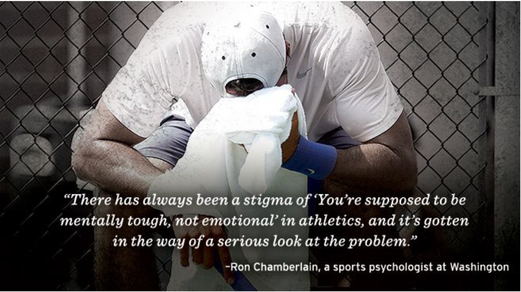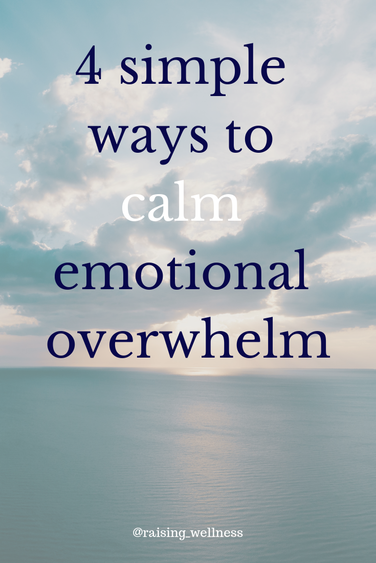|
I have been fortunate to meet wonderful people in my community who are as passionate about athlete mental health as I am. One of my peers works for North Carolina Youth Soccer Association and asked me to write a piece for their May Newsletter to celebrate Mental Health Awareness Month. I loved getting to share my passion with others across the state, and now with all of you! Here is the link to their newsletter version of the article. I have also adapted the article in the post below. Mental health – it seems to be the new buzz word in the sports world, but what does it actually mean? According to mentalhealth.gov, mental health includes our emotional, psychological, and social well-being. It affects how we think, feel, and act. It also helps determine how we handle stress, relate to others, and make choices. Many associate only the diagnosable conditions such as depression and anxiety with mental health; however mental health also encompasses your psychological wellbeing, your ability to control your emotions, your cognitive functioning and your interactions with people. Athlete Specific Mental Health ConcernsAthlete’s exercise, eat healthy and have friends in their teammates, so they must live on the resilient and thriving end of the spectrum, right? Unfortunately, that is not always the case. Athletes are human too, and often have more pressure and responsibility than their peers. In addition to the typical stressors that can initiate a mental health decline such as: academics, life transitions, society, loss; athletes are up against much more when finding balance and maintaining their mental health. High Visibility - Athletes of all ages receive more visibility in their communities than non-athletes. This means that their biggest successes are celebrated, but their struggles are also well documented. In this day and age of social media and instant news, a student-athlete is pressured to be perfect all the time. Samantha Cerio, an Auburn University gymnast who dislocated both of her knees, had to plead with the public to stop sharing the video of her injury because of the emotional response that it triggered in her. Culture of "toughness" - According to research from the University of Michigan, student athletes are less likely to seek help for mental health concerns. About 1 in 3 adults will seek treatment for depression, but in athletes, that number is just 1 in 10. Athletes report stigma-related concerns including team status and playing time. These are concerns felt for all injured athletes, but when you add in the fact that mental illness is an invisible illness and carries an added stigma, the likelihood of student athletes reporting drops significantly. Injury - When an athlete is injured, they can experience grief similar to that of losing a person. Depending on the severity of the injury, the athlete may require surgery and grueling rehab which pulls them away from their team and sport. It is completely normal for athletes to go through periods of denial, anger and resentment before accepting their injury. If the injured athlete is also dealing with anxiety or depression in addition to their injury, it could cause them to experience more significant symptoms than they were before the injury. Time demands (and lack of sleep) - Student-athletes are expected to spend significant time outside their school day dedicated to their sport. Athletes typically spend anywhere from 2-6 hours a day at practice or games. This leads to having to stay up later to complete homework and less sleep than their peers who are non-athletes. In addition to the time spent after school, student-athletes miss more classes due to travel which results in having to make up missed work, adding to their already stressful load. Common Mental Health DisordersAnxiety is the most common mental health disorder amongst adolescents. According to the National Institute of Mental Health (NIMH), 31% of adolescents experience an anxiety disorder. That does not include the individuals who are not diagnosed or seeking treatment for their disorder. Although the prevalence of generalized anxiety disorder is on the rise, not all anxiety is a bad thing. Anxiety and worry can be normal and healthy parts of our lives. It can even be a helpful part of our lives. An example would be when an individual underestimates an opponent or assessment and it results in poor performance it may be that the lack of anxiety led to lack of preparation. Worrying about playing well, relationships and school are expected and normal, so how does one know if it is a problem?
Depression in AthletesBeing a teenager is hard. You are experiencing completely new situations, having responsibilities and expectations dumped on you, trying to get in to college to further your education, balancing social media and real-life drama, all while your body and brain are changing daily. These body and brain changes affect the way you think, behave and respond. Throughout this time in your life it is normal to experience emotional ups and downs. But, if that sadness lingers for weeks or months, it could be more. According to NIMH, in 2017, an estimated 2.3 million adolescents aged 12 to 17 in the United States had at least one major depressive episode with severe impairment. Although depression is common in teens, that does not mean it is not a serious issue. Depression (major depressive disorder) is a medical illness that can interfere with your ability to handle your daily activities, such as sleeping, eating, or managing your school work. Signs & Symptoms of Depression
Ways to helpAnxiety and depression are real. No matter how great your life is, you may still experience these symptoms and need professional help. Just like you would seek help for a broken bone, it is important to get the help you need for your mental health. There are some ways to help us stay more towards the resilient and thriving side of the continuum, that can be done alone or in addition to therapy and medication. This is known as self-care. If you search the hashtag #selfcare on Instagram you will be overloaded with pictures of facemasks, bubble baths and luxurious spa trips. While all of those sound wonderful, they aren’t the types of things I am talking about. What fills your cup, and makes you feel whole again? Those are the things that will help you build resiliency and continue to thrive. It could be as simple as going for a walk (without your phone!), making sure you have eaten a healthy meal and are hydrated, spending time with your loved ones, or dare I say playing a sport other than the one you play competitively just for fun. It does not need to be fancy or Instagram worthy, but doing small things each day to take care of yourself will help you be able to handle the small challenges in your life in a healthy way. Progressive muscle relaxation (PMR) is another technique that is recommended for athletes who are looking for a way to relax. In this simple technique, you slowly tense and relax muscles from your head to your feet. By tensing your muscles before relaxing them, you enable yourself to relax them more thoroughly after you release, letting go of physical tension more effectively. Releasing physical tension can also release psychological stress and tension. Athletes are naturally in tune with their body and more aware of physical sensations that non-athletes, which is why PMR is very effective. How to help othersA question I often get asked by adolescents is how to help their friends. There is a fine line between being a gatekeeper of information, and a safe place for your friends to talk. It is often helpful to have a set of guidelines when talking about difficult topics. The following is adapted from Mental Health First Aid Training: Assess for risk – Is the person you are talking to or concerned about at risk? Risks include self-harm or suicidal thoughts. Signs of being at-risk would be feeling helpless or hopeless, talking about not wanting to be alive anymore, visual signs of self-harm. If you are concerned about their well-being, reach out to a professional or call 911. Listen non-judgementally – Empathy is key here. You want to avoid a negative reaction or judgement about what they are telling you. Understand that everyone is at a different place on the mental health continuum, and what may be a small problem to you could be major to someone else because they are not as resilient. Try and be supportive and understanding. Keep in mind no comforting statement ever started with “at least”. I highly recommend watching Brene Brown’s video on empathy vs. sympathy to learn more. Statements like “ that must be really hard for you” are much better than “Omg, I know, I went through something exactly like that and …….” Being genuine and present will help, even if you don’t say a word. Give reassurance and information – Reassure the person that you care about them and want to help them. If you know of resources, provide them. If you aren’t sure, offer to help the person find them. Remind the person that they are not alone. When in the midst of a mental health crisis, or just a bad day, people can feel very alone and that is a scary feeling. Your presence and reassurance that they matter can do more than you know. Encourage appropriate professional help – This is huge. If someone was complaining about an ankle injury, we would recommend that they talk to an certified athletic trainer or an physician, but when someone mentions mental health issues, the stigma can prevent us from recommending professional help. We don’t want to suggest that we think they are “crazy”. If we change the way we view mental health, and encourage seeking help in the same way we view physical health, we will save more lives. Reducing the stigmaTalk about it – Normalizing the conversation around mental health. As coaches, parents, athletic trainers, older siblings and teammates we can talk about our experiences with mental health like we talk about our experiences with other injuries or disorders. If we mention mental health in our preseason talks, we give our athletes permission to talk about their mental health with us. Posters & handouts – In most athletic training rooms, there are posters showing different anatomical structures, warning signs of dehydration or concussions etc. What if we shared information on anxiety, depression or other mental health concerns? I love the idea of posting quick mindfulness exercises. The more athletes see mental health being taken seriously, the more likely they are to seek help when it is needed. Mental Health AppsCellphones can be a great resource if used properly. Below are a few apps that can benefit your mental health. They provide different ways to relax and decompress.
5 Comments
Fear, frustration, confusion, helpless, annoyance. These are all emotions I’ve heard from parents describing how they feel when their teen is in extreme emotional distress. When our brains are overwhelmed with emotion, we CANNOT process information – meaning it is not the time to try and talk to your teen about feelings or solve their problem. It is the time to implement specific coping skills that help calm the emotional tsunami and find the calm after the storm. TIPP, a dialectical behavior therapy (DBT) skill, helps your teen by changing their body chemistry and bringing a sense of balance and control back. TIPP is an acronym for temperature, intense exercise, paced breathing and progressive muscle relaxation. Let’s look at each one more in depth below : Temperature: An intense change in body temperature helps your body to calm down quickly. Splash your face with cold water, rub ice on your forehead or the inside of your wrist for 20 seconds, keep a facemask in the freezer, or take a hot shower. Intense exercise: Take a fast walk around the block. Do as many burpees or pushups as possible within a minute. 50 jumping jacks. Get that heart rate up and your blood flowing! Paced breathing: Keyword here is paced – slowing down our breathing slows down our body. I recommend using an app on your phone or a video to help pace your breaths to ensure you are getting quality breaths. An example of this is the video below - inhale while the triangle grows, exhale while the triangle shrinks: Progressive muscle relaxation: This is one I love to teach to athletes. Athletes of all levels are in tune with their bodies, and progressive muscle relaxation helps target areas of tension that we may not normally notice. In progressive muscle relaxation you tense and relax the muscles in your body one at a time or all together to release tension and return to calm. Again, I recommend using an app or video to help with this skill, at least initially. An example is the video below. You can’t teach someone to swim while they are drowning, so helping your teen to decrease the emotional overwhelm and find balance in the moment is key.
Need support with your teen helping them overcome extreme emotions? I will work with your teen to create a coping plan that works so that they can love the life they live (even if they have anxiety or depression.) Click the button below and connect with us for a free parent call. I can help you get clear on the behaviors that are hindering your teen’s happiness and collaborate with you to develop a plan for the next best steps in support. |
Christina TaylorFormer Athletic Trainer, current Mental Health Professional. Boston sports lover. Archives
December 2023
Categories
All
|




 RSS Feed
RSS Feed